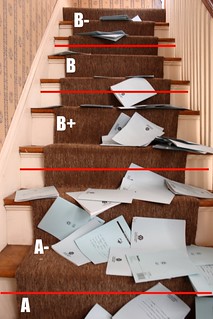Grade cutoffs / ragesoss
In my own experience, it has been rare to be on either side of an assignment (doing it or grading it) that had a very specific marking scheme. My very first professor in a programming class was one of the exceptions: every one of his assignments broke down exactly how each mark from the total could be obtained. This was hugely beneficial to me as a student, because I knew exactly what was expected. Perhaps it was even more beneficial to whoever had to grade it, since they essentially got a checklist to go through, allowing them to evaluate each assignment in the same way.
I often hear objections to this sort of scheme, the biggest being that with a checklist, students have too much spelled out for them. I disagree — if the scheme is done correctly, it should not take away the need to think. If students are able to use the marking scheme to get a perfect grade, then the work that results from that should be exactly what constitutes good work, demonstrating the student learned what they were supposed to. Besides, some of the marks in the scheme can be reserved for more subjective assessments, such as how creative the assignment was.
Creating a really good scheme takes a lot of effort and time, but if the person who created the assignment, and thus knows it best, doesn't do it, the grader will. Chances are, the grader isn't going to do it formally; it will likely happen subconsciously as they go through each assignment, noticing issues here and there. And that will make it difficult to be consistent. It also requires either writing out a lot of specific feedback that helps justify the grade given, or assigning a grade somewhat arbitrarily and hoping the student doesn't come back to ask where it came from.
I really believe that a good, specific marking scheme benefits everyone in the long run. I used such schemes when I taught without realizing how important they were at the time, and I am vowing to myself now that I will continue to do so.


2 comments:
But it is the detailed specific feedback that is valuable, not the mark, so eliminating that is a false savings.
I've always found it very difficult to come up with "point schemes" for the assignments I give—I am often surprised by students going in unexpected directions (both in good and bad ways). There are some general things I look for (correctness, clarity, completeness, and conciseness, for example). But a student can be told to redo an assignment that is very good in many ways, if it fails miserably in one important way.
That is hard to capture in any sort of grading rubric (though I've seen attempts from SBG proponents to do so).
I totally agree that written feedback is also important. I actually don't think that should disappear.
I also think it's fair to say that point schemes don't necessarily fit all assignments. (Though in some cases a more general rubric instead of a checklist style scheme might work - I've found success with that in the past as well.)
But I also have to say that for the assignments I've created that had specific criteria, I still found students expressing their creativity and going in unexpected directions. Maybe I just got lucky, but it leads me to believe that the best (or almost best) of all worlds seems feasible... :)
Post a Comment
Comments are moderated - please be patient while I approve yours.
Note: Only a member of this blog may post a comment.